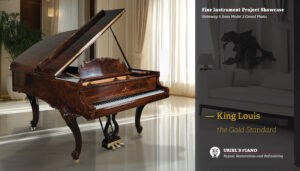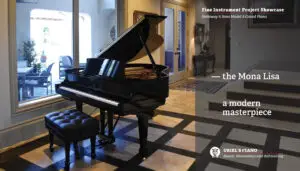Dallas, Texas — Uriel’s Master Woodworks piano restoration experts display the Grotian Grand Piano manufactured in Germany and remarkably restored one hundred years later with great care and detail.
A brief history of the Grotrian Piano Company
On 13 January 1803, Georg Friedrich Karl Grotrian, called Friedrich, was born in Schöningen, Germany. He settled in Moscow to sell pianos, beginning around 1830. He joined a partnership in a small piano-making firm based in Saint Petersburg, and included these pianos among the various instruments he sold in his successful Moscow music shop.
In Germany, Heinrich Engelhard Steinweg (1797–1871) started making pianos in 1835 from his house in Seesen at the edge of the Harz mountains, a source of fine beech and spruce wood for the instruments. Among the pianos Steinweg produced in his first year was a square piano designed and built for Friedrick Grotrian. H.E. Steinweg entered three of his pianos in a state fair in 1839, two square pianos and his grand piano, which brought wide notice. In 1850, H.E. Steinweg took most of his large family to New York City, leaving the piano factory to his eldest son C.F.
Theodor Steinweg (1825–1889), who stayed behind to run it under his name. Meanwhile, in New York City, the Steinweg family Americanized their surname to Steinway, and in 1853 founded Steinway & Sons.
Grotrian-Steinweg’s history dates back to 1835 when the first Steinweg piano factory was built by Heinrich Engelhard Steinweg (later known as Henry Steinway after he emigrated to the US where he founded Steinway & Sons). In 1856, Friedrich Grotrian became a partner; in 1865, his son Wilhelm Grotrian and two associates bought the factory and the right to market their pianos as successors to the Steinweg brand. Ensuing generations of Grotrian family members led the company to become one of the finest piano manufacturers in Germany.
Grotrian-Steinweg sought to expand into the US in the mid-1960s. Steinway & Sons sued to prevent them from using the Steinweg name, resulting in a 1975 decision by the United States Court of Appeals for the Second Circuit. The court ordered Grotrian-Steinweg to stop selling pianos in the US under the “Steinweg” name. Afterward, the company formed a business entity named Grotrian Piano Company to sell pianos in North America.
In 1961, Knut Grotrian-Steinweg joined the company. In 1966, the company formed a contract with Wurlitzer to sell Grotrian-Steinweg pianos in the US, and the Steinway company brought suit in New York. The case lasted nine years, winding its way through trial courts and district courts, presenting the litigants’ counterclaims and appeals. In 1975, the United States Court of Appeals for the Second Circuit heard the arguments in Grotrian, Helfferich, Schulz, Th. Steinweg Nachf. v. Steinway & Sons. Grotrian-Steinweg, the plaintiff, argued that their brand was long established, predating Steinway’s in Germany. Steinway & Sons, defendant, counterclaimed that their brand, well known and strongly positive in the US, was weakened by consumers’ confusion as to whether the pianos were related. The court affirmed the lower court’s ruling in favor of the defendant that piano buyers would be misled in their “initial interest” in the two piano brands; “a potential Steinway buyer may satisfy himself that the less expensive Grotrian-Steinweg is at least as good, if not better, than a Steinway.” The court felt that Grotrian-Steinweg—a brand not very well known in the US—was unfairly given an extra measure of credibility based on the strong reputation that Steinway & Sons had built. Even though premium piano buyers were understood to be sophisticated and knowledgeable, and would not be confused at the time of purchase about which manufacturer produced which piano, the court held that a “subliminal confusion” might be present at the initial attraction to the Grotrian-Steinweg brand. The company was forbidden to sell pianos in the US under the name “Steinweg” after 1977.[4] Accordingly, in 1976 Grotrian-Steinweg formed a subsidiary brand for selling pianos in North America: Grotrian Piano Company.
To read the full un-edited article, please go to:







